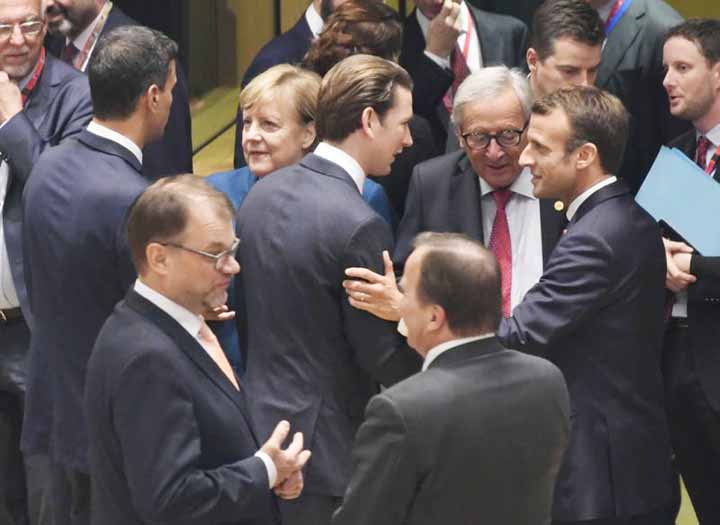
AP, Brussels :
European Union leaders are set Thursday to push ahead with plans to boost cooperation with North African countries and beef up the bloc’s borders in an effort to stop migrants entering Europe.
A draft statement prepared for their summit emphasizes the need to step up cooperation with countries that people leave and transit through to seek shelter or better lives in Europe.
They said that work with those countries on “investigating, apprehending and prosecuting smugglers and traffickers should be intensified.” They also called for a joint smuggling task force to be set up.
Well over 1 million migrants entered Europe in 2015, most of them Syrians and Iraqis fleeing conflict, but numbers have dropped significantly since the EU began outsourcing the challenge to Turkey.
Turkey has been offered at least 3 billion euros ($3.4 billion), ostensibly in Syrian refugee aid, to stop people leaving there for Europe and the bloc wants to reproduce that model elsewhere.
The draft notes that “illegal border crossings” have dropped 95 percent from their peak three years ago, but despite the improvement the 28-nation EU is deeply divided over how to manage the arrivals.
European countries on the Mediterranean like Greece, Italy and more recently Spain feel abandoned to manage the influx alone, with little help from their partners.
Tensions surrounding migrant numbers – which pale in comparison to refugee arrivals in Turkey, Lebanon and Jordan – have fueled support for far-right parties in Europe.
Egypt is a prime candidate for a new partnership. European Council President Donald Tusk and Austrian Chancellor Sebastian Kurz, whose country holds the EU’s rotating presidency, have held talks with Egyptian President Abdel-Fattah el-Sissi, a top army general who took office in 2014. Both men praised him for stopping people from leaving its coast on their way to Europe.
The aim would be to get the Egyptian coast guard to patrol the waters off Libya – the main point for migrants leaving for Italy – and take any rescued people back to Africa.
As the EU tries to strengthen its borders and keep people from crossing the Mediterranean, it has been accused of neglecting migrants and their rights. In response, the bloc has said that it works closely with the U.N.’s refugee agency and the International Organization for Migration.
But both underline that, even though numbers have dropped, more people are dying at sea than ever – more than 1,700 people so far this year – and that the migrant debate has become “dangerously toxic” in some parts of Europe.
“The current tenor of the political debate – painting a picture of Europe under siege – is not only unhelpful but completely out of touch with reality,” U.N. High Commissioner for Refugees Filippo Grandi said in a joint statement. “We cannot forget that we are talking about human lives. Debate is welcome – scapegoating refugees and migrants for political gain is not.”

